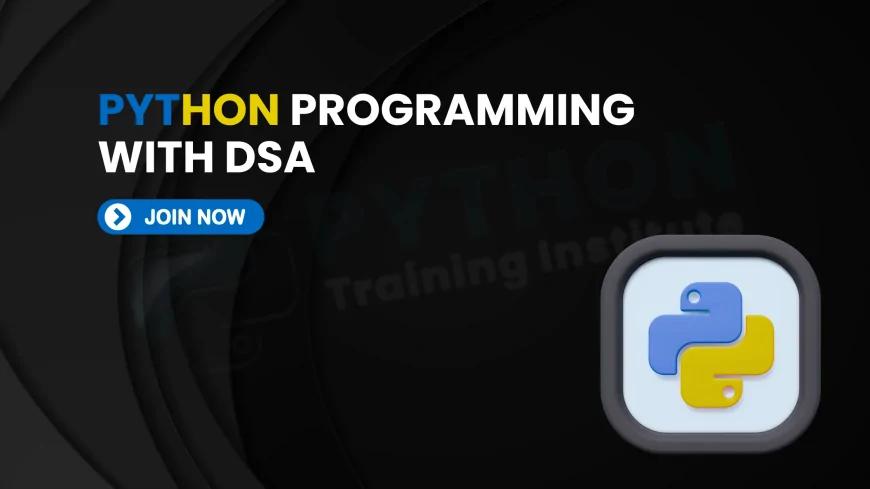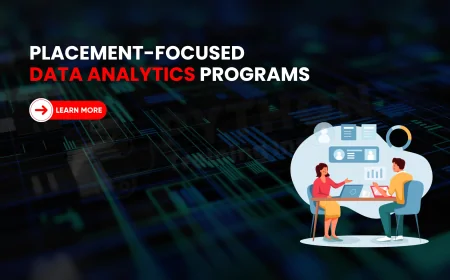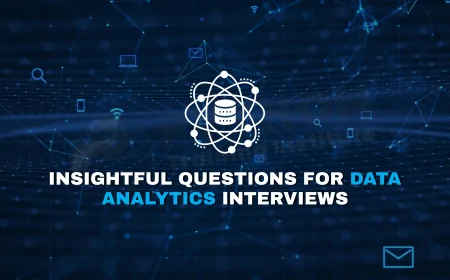Python Data Structures and Algorithms Courses Pune | Python Programming with DSA Courses in Pune
Enroll in top-rated Python Data Structures and Algorithms courses in Pune. Learn arrays, trees, recursion, sorting, searching, and dynamic programming with expert trainers and real-world projects.

Introduction
Data Structures and Algorithms (DSA) are fundamental to programming, enabling developers to tackle complex problems effectively and enhance the efficiency of software applications. Python, with its clean syntax and powerful libraries, has become a preferred language for learning DSA concepts. In Pune, a burgeoning IT hub, there is growing interest in Python DSA courses to enhance technical skills for software development, data science, and competitive programming.
This article explores the landscape of Python Data Structures and Algorithms courses in Pune, discussing what learners can expect, how these courses are structured, and the career benefits they offer.
Why Learn Data Structures and Algorithms with Python?
Python’s readability and simplicity make it an excellent choice for learning fundamental and advanced DSA concepts. Here’s why:
- Simple Syntax: Python lets learners concentrate on solving problems without worrying about complicated syntax..
- Powerful Built-in Data Collections: Lists, dictionaries, sets, and tuples make it easy to grasp essential data structures.
- Strong Community Support: Extensive libraries and forums help learners get support quickly.
- Wide Applications: Python DSA skills are crucial for fields like AI, ML, big data, web development, and more.
- Interview Relevance: Python is often preferred in coding interviews for tech giants, making these skills highly marketable.
Industry Demand for Python DSA Skills in Pune
Pune hosts numerous IT companies, startups, and product firms, all seeking professionals adept in efficient coding and algorithmic thinking. Python DSA skills are in high demand for roles such as:
- Software Developer / Engineer
- Data Scientist / Analyst
- Machine Learning Engineer
- Backend Developer
- Automation Engineer
- Competitive Programmer
Learning DSA not only helps crack interviews but also boosts on-job performance by enabling faster and optimized solutions.
Types of Python DSA Courses Available in Pune
Pune offers a variety of Python DSA courses catering to different learner profiles:
- Beginner Courses: Focus on basic Python syntax and simple data structures like arrays, lists, and dictionaries.
- Intermediate Courses: Cover stacks, queues, linked lists, trees, and fundamental algorithms like sorting and searching.
- Advanced Courses: Dive deep into graphs, dynamic programming, greedy algorithms, recursion, and complex problem-solving.
- Bootcamps: Intensive short-term programs with hands-on projects and interview preparation.
- Online Courses: Flexible self-paced or instructor-led training suitable for working professionals.
Core Concepts Covered
Comprehensive Python DSA courses in Pune typically include:
- Data Structures: Arrays, lists, stacks, queues, linked lists, trees (binary, binary search), heaps, hash tables, and graphs.
- Algorithms: Sorting (bubble, insertion, selection, merge, quicksort), searching (linear, binary), recursion, backtracking.
- Complexity Analysis: Big O notation, time and space complexity.
- Problem Solving: Strategies for tackling coding challenges.
Advanced Algorithmic Techniques
For serious learners, advanced courses explore:
- Dynamic Programming and Memoization
- Graph Algorithms: BFS, DFS, shortest path, minimum spanning tree
- Greedy Algorithms
- Divide and Conquer Strategies
- String Algorithms and Pattern Matching
- Mathematical Algorithms and Number Theory
Effective Learning Methodologies
Training institutes in Pune emphasize varied methodologies for effective learning:
- Interactive Lectures: Live explanations combined with real-time coding.
- Hands-On Coding: Practice sessions using platforms like LeetCode, HackerRank, and CodeChef.
- Assignments & Quizzes: Regular assessments to reinforce learning.
- Peer Learning & Discussion Groups: Collaborative problem solving and knowledge sharing.
- Mentorship & Doubt Clearing: One-on-one guidance from experienced trainers.
Hands-On Practice and Projects
Practical coding is crucial to master DSA concepts. Pune courses include projects such as:
- Implementing custom data structures from scratch.
- Solving real-world problems using graph traversals and shortest path algorithms.
- Creating sorting algorithm visualizers.
- Designing and debugging recursion-based solutions.
- Participating in timed coding contests to simulate interview environments.
Certifications and Career Benefits
Most Pune institutes offer certification on successful course completion, which:
- Validates your proficiency in Python DSA.
- Enhances your resume and LinkedIn profile.
- Helps in job placements with reputed firms.
- Boosts confidence in tackling complex technical interviews.
How to Choose the Right Course in Pune
Consider the following factors:
- Course Curriculum: Depth, practical focus, and alignment with industry trends.
- Trainer Expertise: Industry experience, teaching style, and mentorship availability.
- Batch Flexibility: Weekend, evening, weekday, or online options.
- Reviews and Alumni Success: Past student outcomes and testimonials.
- Placement Assistance: Whether the institute provides interview prep and job support.
- Cost and Duration: Value for money and commitment required.
Enrollment Process and Fees
To enroll in Python DSA courses in Pune:
- Visit the institute’s website or physical center for course details.
- Choose the batch and mode of learning that suits your schedule.
- Complete the registration form and pay the course fee.
- Access pre-course materials and get oriented before classes begin.
- Engage actively in sessions, projects, and assessments.
Fees vary based on course level and duration but typically range from INR 25,000 to INR 70,000.
Frequently Asked Questions (FAQs)
1. Do I need prior programming experience to join Python DSA courses?
Basic knowledge of Python is recommended, but many courses offer beginner-level introductions to bridge the gap.
2. How long do these courses typically last?
Course durations vary from 1 month (intensive bootcamps) to 3-4 months (detailed programs).
3. Are these courses conducted online or offline?
Both modes are available, including hybrid formats for flexibility.
4. Will the course help me prepare for tech interviews?
Yes, interview-focused modules, mock tests, and coding challenges are integral parts.
5. What kinds of projects are included?
Projects range from implementing data structures to solving algorithmic problems like pathfinding and optimization.
6. Is certification provided upon completion?
Yes, most reputed Pune institutes provide recognized certificates.
7. Can working professionals join these courses?
Yes, flexible timings and weekend batches cater to professionals.
8. Are there placement services after course completion?
Many institutes offer placement assistance including resume building and interview coaching.
9. What is the fee range for these courses?
Fees typically range between INR 25,000 to INR 70,000 based on course content and duration.
10. Are group discussions and peer learning part of the course?
Yes, collaborative sessions and study groups are encouraged.
11. Do I get lifetime access to course materials?
Depends on the institute, but many provide lifetime or extended access to videos and notes.
12. How much coding practice is involved?
Significant hands-on coding is emphasized through assignments and online coding platforms.
13. Can this course help me with competitive programming?
Absolutely, many courses are designed to prepare learners for contests like CodeChef and LeetCode.
14. Are there any prerequisites in mathematics?
Basic logic and problem-solving skills are sufficient; advanced math is usually not required.
15. How experienced are the trainers?
Most trainers have industry experience and strong academic backgrounds.
16. Can I switch between online and offline modes?
Some institutes offer flexibility to switch modes depending on your convenience.
17. Are the courses suitable for absolute beginners?
Many courses start from fundamentals, making them suitable for beginners.
18. How do I track my progress during the course?
Regular quizzes, assignments, and mentor feedback help monitor progress.
19. What kind of support is available during the course?
Live sessions, doubt clearing forums, and one-on-one mentorship are commonly provided.
20. How do I enroll in a Python DSA course in Pune?
Research institutes online, compare courses, contact their admission office, and complete the registration process as per their guidelines.
Mastering Python Data Structures and Algorithms is pivotal for anyone aiming for a strong software engineering career or excelling in technical interviews. Pune’s rich ecosystem of experienced trainers, industry-aligned courses, and hands-on learning environments provides the ideal platform to acquire these skills.
Whether you are a student, working professional, or aspiring coder, investing in a comprehensive Python DSA course in Pune will empower you with the knowledge and confidence to solve complex problems efficiently and advance your career in the tech industry.
Conclusion
What's Your Reaction?
 Like
0
Like
0
 Dislike
0
Dislike
0
 Love
0
Love
0
 Funny
0
Funny
0
 Angry
0
Angry
0
 Sad
0
Sad
0
 Wow
0
Wow
0















